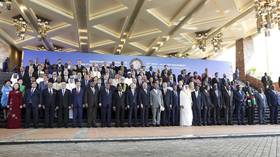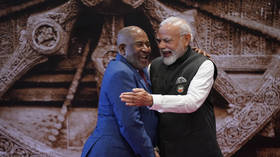Shunned by the West, this African country has found a new friend – and it’s not China

Last week, senior Indian diplomat Dammu Ravi, Secretary (Economic Relations) in the Ministry of External Affairs, paid a visit to Uganda as part of his three-nation African tour. Ravi addressed the Uganda-India Business Conclave, which saw a 35-member multi-sectoral business delegation from India travel to the African country in an effort to expand ties in areas from manufacturing and agriculture to renewable energy, healthcare, and tourism. Developing relations with Uganda is part of India’s broader strategy in Africa – and it comes at a critical time.
In January, Uganda hosted the 19th Non-Aligned Movement (NAM) Summit, followed by the third South Summit and the G77+China summit.
This is indeed an important milestone for Ugandan President Yoweri Museveni, both diplomatically and politically. The landlocked East African country was recently suspended from the African Growth and Opportunity Act (AGOA) by the United States due to multiple accusations related to human rights violations. This was followed by the freezing of new lending to Uganda by the World Bank.
Given the above, Museveni ensured his guests were impressed during the summit. In his speech, he pledged to realign the country’s foreign policy to emphasize greater cooperation among the Global South. In its bid to dodge the American economic bullet, Uganda is seeking new partnerships beyond China. In India, Museveni may see one such opportunity.
India may find Uganda to be a credible partner in East Africa. Undoubtedly, the endorsement for Uganda’s 2024–2027 presidency of the NAM grouping is a testament to the country’s leadership and multilateral engagements. However, New Delhi is likely to tread carefully in furthering its relations with Kampala given its strong ties with China and recent altercation with the US.
Complicated history
The relationship between India and Uganda dates back to when Indian sailors traded goods in dhows across the Indian Ocean, long before the Christian era, when European sailors traveled around the world.
As a matter of fact, the word “dhow” in Swahili refers to any pre-European ship found in the Indian Ocean, especially those that originate in India. After the abolition of slavery in 1834, the British brought with them more than 30,000 Indian ‘coolies’, a racist term for indentured laborers, for the construction of the Uganda Railway. Eventually, a large number of them settled in East Africa and made Uganda their home.
India’s freedom struggle inspired the early Ugandan activists to fight colonization. Known as the Year of Africa, 1960 marked a turning point for African independence with 17 new countries created, and another 18 in the following year. On 14 December, 1960, a “Declaration on the Granting of Independence to Colonial Countries and Peoples” was adopted by the United Nations General Assembly, which proclaimed the necessity to “steadfastly bringing to a speedy and unconditional end the provisions of the Charter and the present colonialism in all its forms and manifestations.” The matter was initially proposed for inclusion in the agenda of the Assembly’s 15th session by the Chairman of the Council of Ministers of the USSR, Nikita Khrushchev, during his address to the General Assembly on September 23, 1960. Uganda became independent on October 9, 1962.
However, in August 1972, Ugandan dictator Idi Amin ordered the country’s entire South Asian population to be expelled, accusing them of sabotaging the economy. Around 50,000 Indians and Persons of Indian Origin (PIOs) along with other Asians had to leave.
Five decades later, in January of this year, President Museveni called that move a “mistake” and expressed gratitude to the Indian community for the service that they have rendered the country over the decades. Indeed, anti-Indian policies were promptly reversed once Museveni assumed office in 1986. Several actions have been taken to guarantee the reinstatement of bilateral relations, including the return of belongings that had been confiscated from Indians and PIOs.
New Delhi and Kampala have significantly deepened trade ties over the past two and a half decades. Since 1995, when the constitution established Uganda as a republic, India’s trade with the African nation has witnessed a sharp rise of almost 9% annually, and today it stands at nearly $1.3 billion. Indian exports to Uganda stand at $695 million, rising from just $57.4 million in 1995.
Since 2008, Uganda has been part of India’s Duty-Free Tariff Preference (DFTP) scheme that New Delhi offers to almost 35 least developed countries. Based on the scheme, 98% of India’s total tariff lines are duty free. Uganda’s exports to India consisted mainly of coffee, cocoa beans, and dried legumes, while it primarily imports pharmaceutical products, vehicles, plastic, paper and paperboard, and organic chemicals.
Betting on strong diaspora
Narendra Modi made history in 2018 when he became the first Indian prime minister to address the Ugandan parliament. During the PM’s visit, several agreements were signed, including one that waived the requirement for a visa for official and diplomatic passport holders, established a regional material laboratory in Uganda, and agreed to bilateral defense cooperation. Modi also announced two lines of credit totaling $64 million for the production of dairy and agricultural products, as well as $141 million for the construction of electrical lines and substations. Additionally, it was announced that numerous Indian Army training centers would provide additional training to the Uganda People’s Defense Force.
India’s first overseas educational campus was established in Uganda when, in April 2023, the National Forensic Sciences University (NFSU) of India inaugurated its campus in Jinja.
Notably, this town on the shores of Lake Victoria in Southern Uganda is also the center of the country’s Indian community. In 1997, then-Prime Minister Inder Kumar Gujral unveiled a bust of Mahatma Gandhi there. Few know that in 1948, a portion of Gandhi’s ashes were immersed in the Nile near Jinja.
Today, the Indian diaspora residing in Uganda exhibits the most robust and long-lasting cultural and economic ties towards the country. There may only be 20,000 Indians in Uganda, making up less than 1% of its overall population, but they provide about 65% of all national taxes.
Indeed, Indians living in Uganda play a significant role in the economy, especially in sectors like manufacturing, trade, agro-processing, banking, sugar, real estate, hotels, tourism, and information technology. They are not only some of the biggest taxpayers, but also provide jobs to thousands of Ugandans. Over the last two decades, these PIOs and NRIs have invested more than $1 billion in Uganda.
To further India’s connectivity with the East African country, Uganda Airlines last year launched direct flights between Kampala and Mumbai. The service, initially revealed in 2021, is only the second Uganda Airlines’ destination outside of Africa. As a result, the company joined Tanzania, Kenya, Rwanda, and Ethiopia as the fifth flag carrier to connect their national capitals with India. The airline now operates from Mumbai thrice a week and aspires to expand to include new and important destinations in Delhi and Chennai.
Diplomatic rapprochement
Uganda has vacillated between steady economic growth and authoritarian leadership. President Museveni, who has been ruling the country for 35 years, won another term in 2021 and is set to lead for another five years.
While the country has managed to rebound from the pandemic and marked a 5.3% growth in the 2023 financial year ($114 billion at the end of 2023 in PPP term), the state of its economy looks dire amid mounting debt from China, the World Bank and the IMF, including a $1 billion Extended Credit Facility (ECF) for past-pandemic recovery from the IMF.
Since Uganda’s severe anti-LGBTQ legislation, its relations with the US have plummeted. To recall, in May 2023, Uganda enacted its contentious Anti-Homosexuality Act, which carries a life sentence or potentially the death penalty for homosexuality.
Since January, the US has barred Uganda from benefitting from AGOA as a measure of punishment. AGOA is a preferential trade arrangement which allows member countries duty-free access to the US market for around 6,000 products.
Clearly, the US decision has created ripple effects for Uganda’s economy, deterring World Bank loans and many Western foreign direct investments. As this economic pushback may potentially increase the inequality in the already volatile nation, Uganda may eventually lean on economic support from China. In the words of President Museveni, “In case Uganda has no other choice than borrowing, there exists plenty of non-Bretton Woods sources who are eager to lend.”
With huge opportunities available in the Indian market, Uganda can make better use of India’s duty-free tariff scheme, and recover its losses from missing out on AGOA. Stronger India-Uganda relations, including bilateral trade and increased investments from India, could deter the country from turning entirely towards China.
Currently, India and Uganda are two of the closest allies. As Uganda retains the presidency of NAM for the next three years, India can make use of its historic and present relations with Uganda and together, may effectively assume the leadership of the Global South under the banner of NAM. Indeed, Indian Foreign Minister Subrahmanyam Jaishankar’s second visit to Uganda in as many years is a powerful sign of growing bonhomie between the two countries and the relevance of one to the other.
However, India’s role as a champion and future leader of the Global South will be determined by how well it manages its multi-alignment. After successfully hosting the G20, India must contribute to Uganda’s NAM presidency, keeping the right balance with the West, particularly when the Ugandan economy is still crippled by Western sanctions.
The statements, views and opinions expressed in this column are solely those of the author and do not necessarily represent those of RT.

















